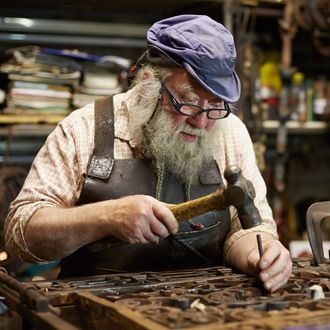
In addition to a legacy of impressive hats, 19th-century German Chancellor Otto von Bismarck gave the world the first national retirement plan. Fearful of Europe’s rabble-rousing Marxists, Bismarck figured it would be a way to get everybody to chill out about more drastic socialist reforms. He selected 70 as the age of pension, because — morbid as it might have been — that was how long Germans could be expected to live.
Bismark was labeled a socialist by the talking heads of his day, and so was Franklin D. Roosevelt, who introduced Social Security to the U.S., in 1935. Today, retirement age is associated with receiving full Social Security benefits, which will start at age 67 for people born after 1960.
But maybe that isn’t the finish line any longer. Judging by the way people are living today — some depressed in retirement, other energized by continuing to work — maybe retiring isn’t what we should be looking forward to. Especially if one of the underlying assumptions of retirement — that you’re going to die reasonably soon after entering your golden years —is about to change.
The main variable of retirement (age) is not as constant as you might think. Life expectancy is going up worldwide, thanks to gains in health care and people smoking and drinking less (unless you’re in the former USSR). In the United States, life expectancy is at 78.8 years. With the rise of genetic technologies, people could start living way, way longer — as in, the first person to healthfully live to 150 is possibly already alive. Aubrey de Grey, chief science officer of the SENS Research Foundation, says that living to 1,000 will become a commonplace thing, and that it won’t just be for rich people. If it becomes a middle-class expectation to live to 100, then 67 as the age at which people retire seems pretty out of touch.
Then there’s the stack of research indicating that retirement — contra to the endless weekend you might hope it to be — is in fact pretty rough on people. The case seems to be especially bad for men, reports Brenda Bouw for The Globe and Mail, because they derive so much of their identity from the work that they do, though you’d expect the finding to change as women, so long kept out of professional life, face retirement after having long careers. A 2013 Institute of Economic Affairs analysis found that retirees were 40 percent more likely to be diagnosed with clinical depression — and that there would be a “win-win” between economic growth and personal health if older people were not encouraged to exit the workforce by state pensions. One suicide researcher told ThinkAdvisor that if men can’t transfer their attachment from work to new interests, they’re more likely to risk depression.
Indeed, finding new passions does seem to help men retire in a fruitful way: In Australia, Ireland, and Canada, “men’s sheds” are becoming a thing. They’re a community space where older gents can bro down by way of woodworking or repairing things. A 2013 Canadian study found that the sheds keep dudes healthy and engaged, and a 2015 Australian study found that the sheds are indeed a way to help men find purpose.
But if you like what you do, the best solution might just be to keep doing it. This is brought to beautiful light in Twenty Over Eighty: Conversations on a Lifetime in Architecture and Design, a new book of interviews with octogenarian designers. Illustrator Seymour Chwast, 86, just completed a Kickstarter campaign for his new antiwar book, At War With a War, in January. “I don’t understand retiring,” he told Fast Company. “I don’t know what I’d do. I don’t play golf. I have to sit at a drawing table or else it’s a wasted day.” Milton Glaser, the iconic designer behind I ♥ NY and this very publication’s logo, is even more resolute. “To work at things that are central to your life and your perception of yourself, why would you want to retire from that?” he said in Quartz. “I want to die at my desk.”




